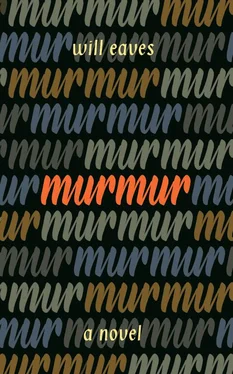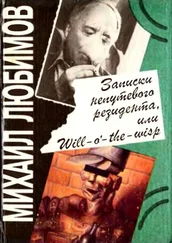Trentham directs me to a window table and a view of the approaching pacifists, who do not seem so disparate as heretofore and wear the leveled expression of those who, on a point of principle, know what they’re going to do. And in the scuffle, it’s an ardent objector who has the best of it, before the two policemen in the back of Rosselli’s put on helmets and go outside to break things up. His last punch thrown, into the face of an astonished veteran with pouchy eyes, the fighter is restrained to jeers and shouts. But by our seat he stops, struggling within his captors’ arms, the other side of the window.
He frees one hand. He points at us, at me. His face is flushed, working with muffled rage. He spits upon the glass. Shrill calumnies draw interest from the crowd, and even from the policemen who edge closer, searching the café’s silent depths. For Rosselli’s is emptying, its stoves unlit, its tables cleared or abandoned. A cup rocks on its side. A light goes off. Out of the door into the street the customers go, the mothers and their smiling, headscarfed friends; the satisfied retired teachers who can’t remember what they taught; urgent young scribes, tradesmen yawning (they’re up at four, the market day is almost done), choirboys clutching their dog-eared copies of Stanford in C , Molyneaux with a bloodstained handkerchief pressed to his mouth, Stallbrook from Wargrave, puce with lust or shame, and Matron yapping on her lead.
The rest, all those who spend their lives in restaurants eavesdropping on the next table, are chivvied through the doorway by Piero Rosselli himself. Go on, he says to the rowers hugging their puppet blades, “ Ma andiamo! ”
“What will you have?” Trentham asks me.
In Market Square, the Bentleys’ doors open and men get out, carrying planks, nothing so very bad, but then I cannot tell idlers from subversives. They build a scaffold in the center of the market and put sawdust down.
“What do you feel as if you’d like?” Trentham demands again.
I will not look out of the window anymore.
According to the menu, I can have Set One or Set Zero.
Trentham is calm; needs me to act as if nothing is wrong. His neat solicitude, nice hair, and very nearly straight necktie are true. But looking at the bunch of paper flowers in the vase, I think of all the real blooms twenty yards away, the bucket’s sloppy edge, the roars of approval, the generous display.
*
Dear June,
It’s interesting that you should mention fair play, because as you know I’ve always felt it to be an important point. If a machine appears to think, why should we go on insisting it does not? And then the subject came up again at that very dinner you mention with Max N. My probation officer was present, yes, but then it is his job to keep an eye on me, and as it happens the arrangement is quite convivial. He is an intelligent young man—he was the one who congratulated me on my “lovely statement,” as I think I told you—and was asking me if I’d ever been a member of the Cambridge secret societies. Max choked on his homemade sponge cake and said they wouldn’t have been very secret with me on board, which I took to be an unkind reference to my cantabile voice, or possibly my innate sense of style, but June, I forgave him. I said I understood him (the officer) to mean the Nomads, and, no, they’d never made any overtures. And then I stopped, and thought about it.
Because the point of the Nomads’ ceremonious election procedure was that you never knew if it was taking place or not. Very unfair. You could be in bed with someone or making tea in your underclothes or on the toilet and someone might ask you a question (call out to you, I imagine, if you were on the toilet) and that would be the interview and you wouldn’t know anything about it. You wouldn’t have any way of knowing the significance of anything: the whole of your life could have a determined structure—be part of an interview—and you wouldn’t know.
And if you didn’t know, you wouldn’t be any less free to “do as you please,” it always seemed to me. If a computer somehow managed to simulate a world with conscious yous and mes running about in it, then from your point of view and mine we’d be conscious and the fact that we were simulated would be neither here nor there.
When I was at Cambridge, reading Russell and Gödel, tackling them both, I used to think about that class—you know, the Class of All Thinkable Things, it being a member of itself and therefore non-normal and so on. And it struck me, now, that there was all the time the possibility of another class, the Class of All Unthinkable Things, in precisely the sense I’ve outlined, June—a determinism you’re not let in on, a SECRET SOCIETY! “I can’t think about it, it can’t occur to me, so I’m no worse off.” Completely fair.
But Mr. Pryor, said Hamish (his name), you do know about us, as we know about you, and we are watching you, and I am telling you we are. Good point, I said. (I like him. He was complimentary about the sponge cake, too.) I know you are, but I like to pretend that I am not merely a creature of punitive regulation, just as certain people know full well what homosexuality is but would prefer not to think about it.
Of course that is why I defend machines, too. Anyone can see that intelligent machinery is possible, they just don’t want to have to admit it.
I could see Max’s eyes narrowing and Hamish going slightly red, so I left it at that.
The funny thing is that I’m no longer sure what the relationship is between what people do or say and what they think. Look at that young man. He is upholding the law and he would have sent me to prison if need be, but he likes coming to dinner and is amiable. Who knows what he really thinks? Who needs secret societies when you have society’s secrecy? Plenty of those who condemn me probably do not feel, deep down, I’ve done much wrong, or care particularly one way or the other. We all know sex is ungovernable. It is a matter of energy, like most things. The costs go up as we get older.
Some will have said “how revolting.” Are they revolted? Truly? Which of us has not felt betrayed by the words that come out of our mouths, even when they are spoken with utmost sincerity? Doesn’t saying something evoke in most of us a wrinkle of suspicion that what we want to communicate is often much deeper, more complex and subtle, than the dilute words we use? That is why we smile while speaking, or cry, or shudder, or touch. These are eloquent gestures, as silence may also be eloquent.
I’m reading Austen again. I used to think Anne’s kindly cast of mind was everywhere demonstrated by her actions. Now I don’t know. I suppose the irony is that she went along with things she didn’t actually agree with and in the end it didn’t matter.
I went to Stallbrook with some of this, and a tantalizing dream I can’t remember. I spent ages before our session trying to retrieve it, but my system of recall is imperfect. I reach for something—a boy I knew at Cambridge who was kind to me and turned out to be a Nomad himself—and the whole thing crashes like a lot of junk falling off a shelf. I’m finding it hard to concentrate, anyway.
Stallbrook recommended meditation—one of those Eastern traditions your husband so wisely values. So I have been looking at the gray poplar in front of my window, here on the common, and I watch the motion of the leaves, only yesterday it was very misty and the leaves were but hints of leaves, and I remembered the dream had fog in it.
Fog interests me. It hides things. Sometimes you know they are there (they are thinkable). Sometimes you don’t…
Don’t worry about Trentham. He is a creature of the university, no doubt, but there’s no harm in him. Princeton, naturally. Our paths hardly cross, though I appreciate your concern. And yes, I remember the chess set. The pieces in pieces. Alas!
Читать дальше












